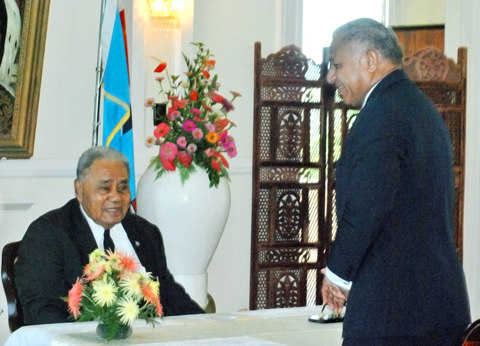Fiji’s president yesterday reappointed former coup leader Commodore Frank Bainimarama to head the politically unstable South Pacific nation’s government, less than two days after a court ruled his 2006 coup illegal.
Fiji has suffered four coups and a bloody military mutiny since 1987, mainly as a result of tensions between the majority indigenous Fijian population and the economically powerful ethnic Indian minority.
Bainimarama was sworn in as caretaker prime minister in the morning by Fijian President Ratu Josefa Iloilo, who on Friday annulled the 1997 constitution and sacked the judges who declared Bainimarama’s former government illegal on Thursday.

PHOTO: AFP
“He just came, he read the oath and he was appointed as prime minister,” a local journalist said by telephone.
In the afternoon Bainimarama, who is also military chief, reappointed nine ministers in his former government to the same posts. They were sworn in by Iloilo, an ethnic Fijian like Bainimarama.
Bainimarama came to power in a bloodless 2006 coup. On Thursday the Court of Appeal overturned an earlier judgment that his government was legal. Bainimarama initially said he would step down.
However, after annulling the constitution, the president enacted emergency powers for the country’s military and police, initially for 30 days but with the possibility of extension.
He also issued a decree giving himself the power to appoint a prime minister by decree and other ministers on the advice of the prime minister. These powers are to remain in force until a parliament is elected under a new constitution yet to be adopted.
Iloilo has called for fresh elections in 2014, but his actions have been widely criticized overseas.
UN Secretary-General Ban Ki-moon has criticized the annulment of Fiji’s constitution and called for it to be reversed.
However, despite the political upheavals, the situation in Suva has remained calm for the Easter weekend.
Australian Trade Minister Simon Crean said yesterday the events in Suva were likely to further damage Fiji’s economy, which has suffered since the coup. On Thursday, the Reserve Bank of Fiji predicted that the economy would contract by 0.3 percent this year, compared with an expansion of 2.4 percent last year.
A leading analyst said Fiji could also expect tightening of sanctions and further action from both the Commonwealth and the Pacific Islands Forum, while tourists were likely to be scared off.
There was no doubt the judges’ decision was legally correct, analyst Damien Kingsbury said, and Bainimarama and his supporters were clearly digging themselves in to try to hang on to power.
“It is certainly a circumvention of any democratic process, or any return to democratic process. It also shows that Fiji is not a country at the moment that is governed by the rule of law,” said Kingsbury, associate professor in the School of International and Political Studies at Australia’s Deakin University.
“Fiji also relies heavily on tourism. I think tourists these days are increasingly gun shy,” he said.

With much pomp and circumstance, Cairo is today to inaugurate the long-awaited Grand Egyptian Museum (GEM), widely presented as the crowning jewel on authorities’ efforts to overhaul the country’s vital tourism industry. With a panoramic view of the Giza pyramids plateau, the museum houses thousands of artifacts spanning more than 5,000 years of Egyptian antiquity at a whopping cost of more than US$1 billion. More than two decades in the making, the ultra-modern museum anticipates 5 million visitors annually, with never-before-seen relics on display. In the run-up to the grand opening, Egyptian media and official statements have hailed the “historic moment,” describing the

‘CHILD PORNOGRAPHY’: The doll on Shein’s Web site measure about 80cm in height, and it was holding a teddy bear in a photo published by a daily newspaper France’s anti-fraud unit on Saturday said it had reported Asian e-commerce giant Shein (希音) for selling what it described as “sex dolls with a childlike appearance.” The French Directorate General for Competition, Consumer Affairs and Fraud Control (DGCCRF) said in a statement that the “description and categorization” of the items on Shein’s Web site “make it difficult to doubt the child pornography nature of the content.” Shortly after the statement, Shein announced that the dolls in question had been withdrawn from its platform and that it had launched an internal inquiry. On its Web site, Le Parisien daily published a

China’s Shenzhou-20 crewed spacecraft has delayed its return mission to Earth after the vessel was possibly hit by tiny bits of space debris, the country’s human spaceflight agency said yesterday, an unusual situation that could disrupt the operation of the country’s space station Tiangong. An impact analysis and risk assessment are underway, the China Manned Space Agency (CMSA) said in a statement, without providing a new schedule for the return mission, which was originally set to land in northern China yesterday. The delay highlights the danger to space travel posed by increasing amounts of debris, such as discarded launch vehicles or vessel

RUBBER STAMP? The latest legislative session was the most productive in the number of bills passed, but critics attributed it to a lack of dissenting voices On their last day at work, Hong Kong’s lawmakers — the first batch chosen under Beijing’s mantra of “patriots administering Hong Kong” — posed for group pictures, celebrating a job well done after four years of opposition-free politics. However, despite their smiles, about one-third of the Legislative Council will not seek another term in next month’s election, with the self-described non-establishment figure Tik Chi-yuen (狄志遠) being among those bowing out. “It used to be that [the legislature] had the benefit of free expression... Now it is more uniform. There are multiple voices, but they are not diverse enough,” Tik said, comparing it